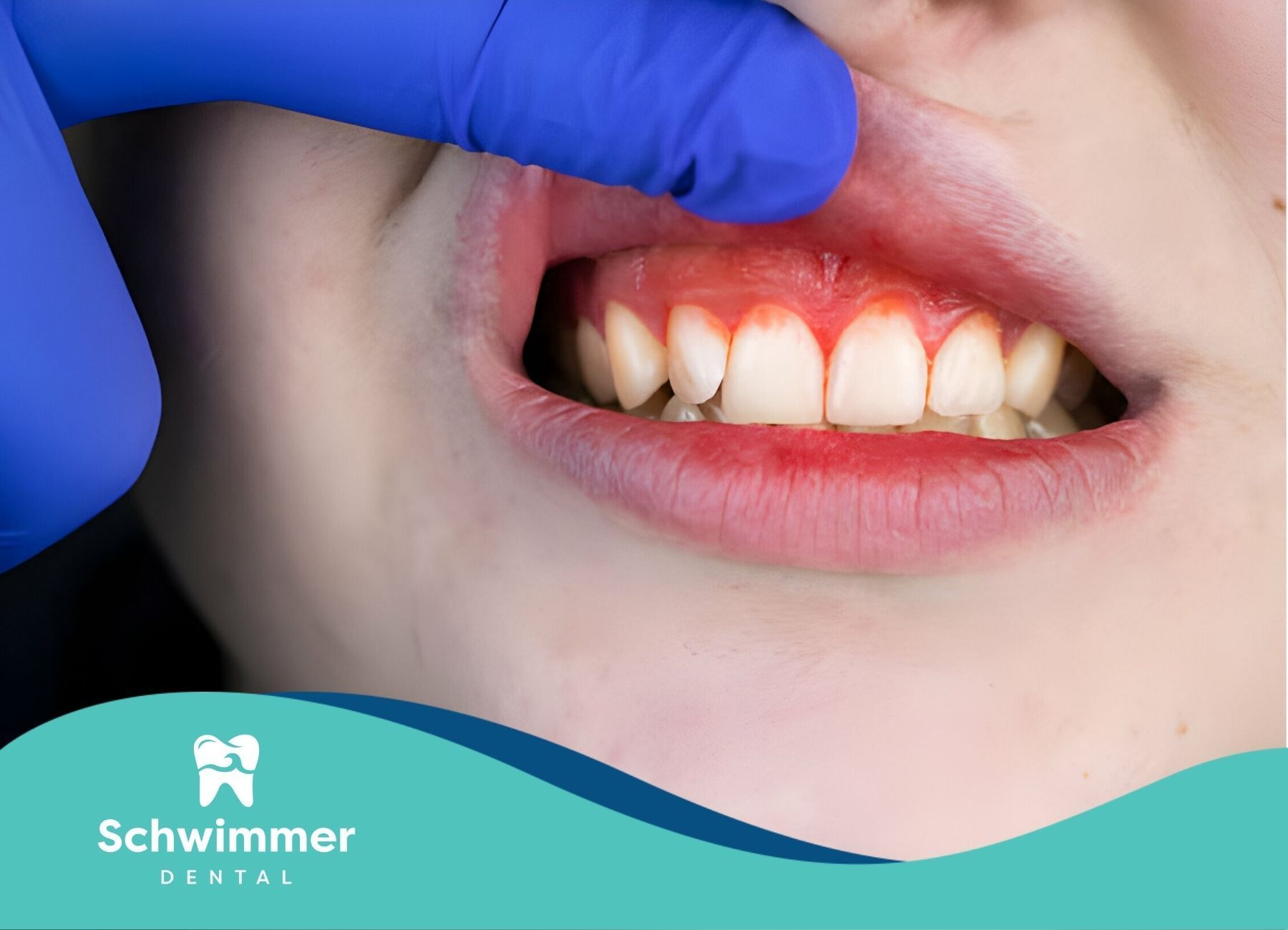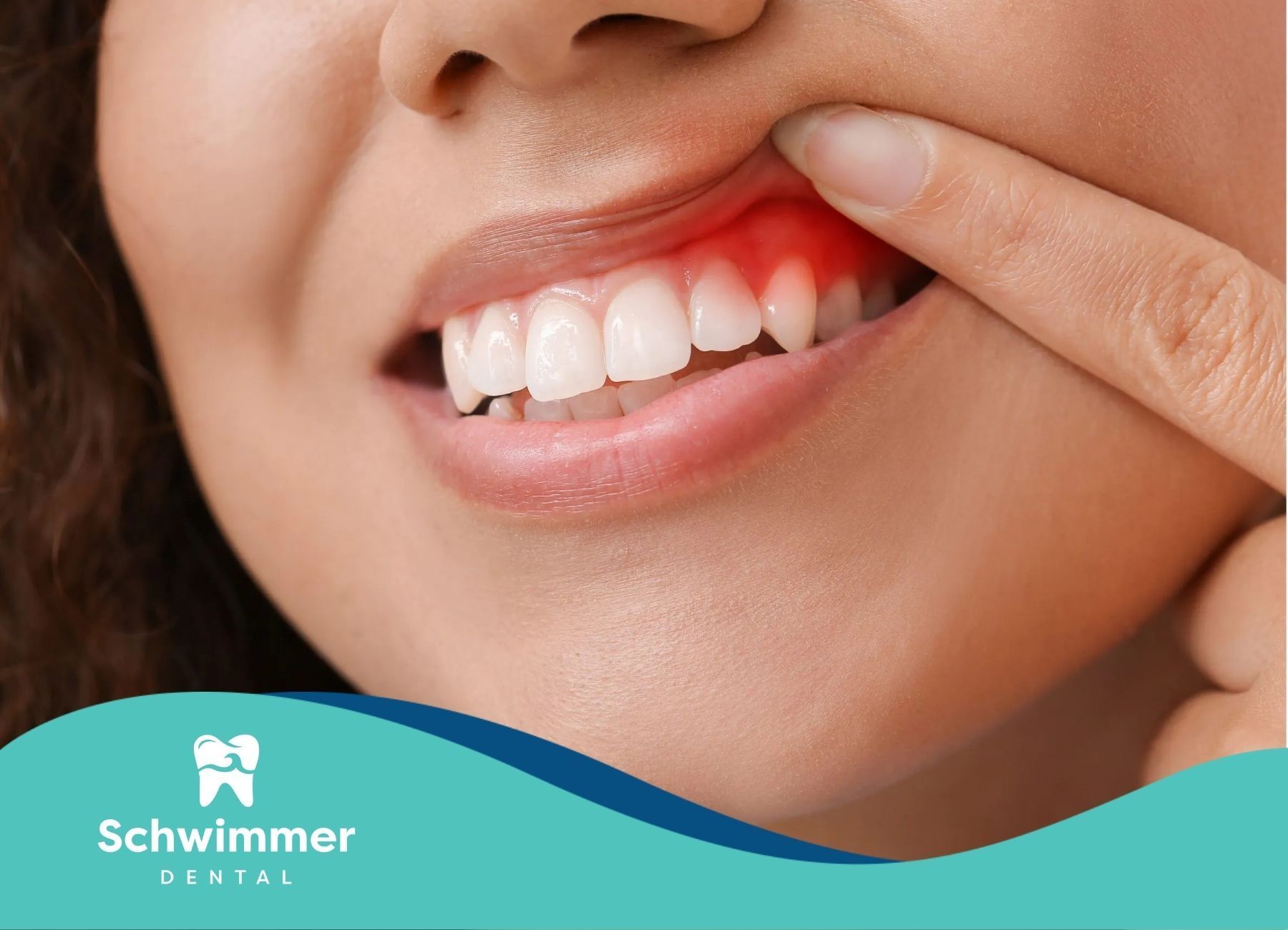Have an appointment? Complete the Intake Form
What Causes Dry Mouth? Symptoms, Risks, and Relief Tips
Key Highlights
- Dry mouth, also known as xerostomia, is a common condition where your salivary glands don't produce enough saliva.
- Medications, systemic diseases, and lifestyle choices can all contribute to dry mouth.
- Common symptoms include a sticky or dry feeling in the mouth, difficulty swallowing, and bad breath.
- If left untreated, dry mouth can have long-term effects like an increased risk of tooth decay, gum disease, and mouth sores.
- Lifestyle changes such as staying hydrated and maintaining good oral hygiene can help alleviate dry mouth symptoms.
Have you ever experienced that uncomfortable, parched feeling in your mouth that just won’t go away? This condition, called dry mouth or xerostomia, happens when your salivary glands aren’t producing enough saliva to keep your mouth moist. Saliva isn’t just there for comfort—it’s crucial for chewing, swallowing, and protecting your teeth from decay.
In this article, we’ll dive into the common causes of dry mouth, its symptoms, and the long-term effects it can have on your oral health. More importantly, we’ll guide you through practical tips to manage dry mouth and regain your comfort and confidence.
Exploring the Basics of Dry Mouth
Let's start by understanding what dry mouth is all about. Saliva plays a crucial role in maintaining our oral health. It helps us chew and swallow food comfortably, washes away food particles, neutralizes acids, and keeps our mouths moist. When saliva production decreases, the mouth becomes dry and uncomfortable.
This lack of saliva can lead to a range of issues, from difficulty speaking to an increased risk of dental problems. Dry mouth can affect people of all ages, but it becomes increasingly common as we get older. Luckily, dry mouth can often be managed with simple lifestyle changes and over-the-counter remedies.
Defining Dry Mouth and Its Importance
Characterized by a persistent lack of saliva, dry mouth is more than just a minor inconvenience. It signifies a disruption in the normal flow of saliva, which is essential for a healthy mouth. Saliva, produced by the salivary glands located on the floor of the mouth, serves as a natural lubricant, aiding in chewing, swallowing, and speaking.
Beyond its role in basic oral functions, saliva plays a crucial part in maintaining the delicate balance of our oral microbiome. It helps control the bacteria and fungi that naturally reside in our mouths, preventing their overgrowth and potential for causing infections.
When saliva production diminishes, our mouths become more susceptible to infections and other dental problems, including how much saliva is produced. Understanding the causes and symptoms of dry mouth can empower you to take proactive steps toward maintaining optimal oral health.
The Role of Saliva in Oral Health
We often overlook the significance of saliva, but it acts as a silent guardian for our oral health. Its constant flow helps wash away food debris and harmful bacteria, contributing significantly to good oral hygiene. The enzymes present in saliva play a crucial role in neutralizing acids produced by bacteria, protecting our teeth from erosion and decay.
Furthermore, saliva contains minerals like calcium and phosphate that help strengthen tooth enamel and repair early signs of tooth decay. This intricate process highlights the profound impact saliva production has on maintaining a healthy smile.
Reduced saliva flow creates an environment conducive to bacterial growth, increasing the risk of tooth decay, gum disease, and other oral health issues. Therefore, addressing the underlying causes of dry mouth is paramount for preserving not only our oral health but also our overall well-being.
What are the Causes of Dry Mouth?
Dry mouth can stem from a variety of factors. Sometimes it's a temporary condition resulting from dehydration or stress. However, in many cases, dry mouth is a side effect of certain medications or a symptom of an underlying medical condition that may require medical treatments.
Understanding these causes is the first step toward finding effective solutions for managing and alleviating dry mouth symptoms.
Medications and Their Impact on Saliva Production
It might be surprising to learn that hundreds of commonly prescribed and over-the-counter medications can decrease saliva production. This reduction in saliva flow is often an overlooked side effect of many drugs used to treat a wide range of conditions, including allergies, high blood pressure, depression, and anxiety. Your provider may also recommend blood tests to further evaluate the underlying causes.
If you've noticed persistent dry mouth, it's important to review your medication list with your doctor or pharmacist. They can help determine if any of your medications might be contributing to your symptoms. If a medication is identified as the culprit, your doctor may suggest adjusting the dosage or exploring alternative medications with fewer side effects.
It's important never to stop taking prescribed medications without first consulting your healthcare provider. They can advise you on the safest course of action to manage both your health condition and any medication side effects.
Systemic Diseases Contributing to Dry Mouth
In addition to medications, several systemic diseases can also contribute to dry mouth. Certain medical conditions, including salivary gland stones, can directly or indirectly affect the salivary glands, impairing their ability to produce sufficient saliva.
Autoimmune diseases, such as Sjögren's syndrome, are known to target the moisture-producing glands in the body, including the salivary glands. This can lead to a significant reduction in saliva production and cause severe dry mouth. Additionally, conditions like diabetes, HIV/AIDS, and rheumatoid arthritis can also increase the risk of developing dry mouth.
If your doctor suspects an underlying medical condition might be causing your dry mouth, they may recommend further tests and evaluations to confirm the diagnosis and recommend appropriate treatment options.
Recognizing Symptoms of Dry Mouth
Recognizing the symptoms of dry mouth is crucial for early intervention. While a dry or sticky feeling in your mouth is the most obvious sign, other common symptoms include bad breath, persistent sore throat, difficulty speaking, and a burning sensation on the tongue.
It's important to remember that experiencing these symptoms occasionally might not be a cause for concern. However, if you find these symptoms persistent and interfering with your daily life, it's best to consult your healthcare provider.
Common Signs Indicating You Might Have Dry Mouth
Beyond the telltale dryness, several other symptoms of dry mouth can manifest, varying in severity from person to person. Pay close attention to changes in your mouth, such as cracked lips, dry lips, a rough or red tongue, persistent bad breath, and difficulty chewing or swallowing, especially dry foods.
You might also notice changes beyond your mouth, including dry eyes, nose, or skin. While these symptoms may be linked to other health conditions, their presence alongside dry mouth warrants a consultation with your healthcare provider for proper diagnosis.
Ignoring these symptoms can lead to more serious dental problems and discomfort in the long run, highlighting the importance of addressing dry mouth sooner rather than later.
Long-term Effects of Untreated Dry Mouth
While dry mouth might seem like a minor inconvenience, leaving it untreated can have long-term consequences. The lack of saliva's protective properties increases the risk of various oral health issues.
One of the most significant risks is tooth decay. Saliva helps neutralize acids in the mouth, preventing them from eroding tooth enamel. Without enough saliva, teeth become more vulnerable to cavities and decay.
Additionally, gum disease, mouth sores, and fungal infections like thrush are more prevalent in people with dry mouth. In severe cases, untreated dry mouth can also lead to problems with taste, difficulty speaking, and even nerve damage in the mouth.
Effective Management Strategies for Dry Mouth
The good news is that dry mouth can often be managed with simple lifestyle changes and over-the-counter remedies. These strategies focus on stimulating saliva production, keeping your mouth hydrated, and minimizing the discomfort associated with dry mouth.
By incorporating these solutions into your daily routine, you can significantly improve your oral comfort and minimize your risk of developing long-term dental problems.
Lifestyle Changes to Alleviate Dry Mouth Symptoms
Making certain lifestyle tweaks can work wonders in alleviating dry mouth symptoms. Staying properly hydrated is crucial, so aim to drink plenty of water throughout the day. Consider carrying a reusable water bottle with you to encourage frequent sips.
Certain foods and beverages can exacerbate dry mouth. Avoid or limit your intake of sugary drinks, caffeinated beverages, alcohol, and spicy or acidic foods such as fruit juices. Instead, opt for hydrating fruits and vegetables, and consider chewing sugar-free gum with xylitol to stimulate saliva production.
Here are some additional lifestyle changes to consider:
- Maintain Good Oral Hygiene: Brush your teeth twice a day and floss daily. Consider using a toothpaste and mouthwash specially formulated for dry mouth.
- Avoid Tobacco and Alcohol: These substances can worsen dry mouth symptoms.
- Breathe Through Your Nose: Mouth breathing can dry out your mouth.
- Use a Humidifier: Especially during dry months or in air-conditioned environments, a humidifier can add moisture to the air.
Over-the-Counter Solutions and Home Remedies
In addition to lifestyle changes, several over-the-counter products and home remedies can provide relief from dry mouth. Artificial saliva substitutes are available in sprays, gels, rinses, and lozenges. These products can temporarily moisten the mouth and provide lubrication.
Another helpful option is to use hydrating lozenges or chew sugar-free gum containing xylitol. These can stimulate saliva production, providing a refreshing sensation and helping alleviate dry mouth. Using a lip balm can also prevent dryness and cracking of the lips, a common symptom of dry mouth.
Consider these over-the-counter solutions:
| Product | Description |
|---|---|
| Artificial Saliva Substitute | Available in sprays, rinses, gels, and lozenges; temporarily moistens and lubricates the mouth |
| Hydrating Lozenges | Stimulates saliva production, provides relief from dryness |
| Sugar-Free Gum with Xylitol | Promotes saliva flow, freshens breath |
| Lip Balm | Prevents dry and cracked lips |
Conclusion
Dry mouth can impact your oral health significantly, but with the right strategies, you can manage it effectively. By making simple lifestyle changes and using over-the-counter remedies, you can alleviate dry mouth symptoms.
Remember, staying hydrated is crucial in managing dry mouth, as dehydration can worsen its effects. Watch out for foods that may exacerbate dry mouth and prioritize a saliva-friendly diet. Take charge of your oral health by adopting habits that promote moisture and comfort in your mouth.
At Schwimmer Dental, we specialize in personalized care for conditions like dry mouth. Whether you need a professional diagnosis, treatments to boost saliva production, or guidance on maintaining optimal oral health, our experienced team is here to help. Contact Schwimmer Dental and take the first step toward a healthier, more comfortable smile!
FAQs
What daily habits can help manage dry mouth?
To manage dry mouth, drink plenty of water throughout the day to stay hydrated. Chew sugar-free gum or suck on sugar-free candies to stimulate saliva production, and try to avoid mouth breathing.
How does dehydration affect dry mouth symptoms?
Dehydration can worsen dry mouth symptoms as it reduces saliva production. If your mouth is dry, you are likely dehydrated. Drink regular sips of water throughout the day to improve your symptoms.
Can certain foods exacerbate dry mouth?
Yes, spicy foods, acidic foods, caffeinated drinks, and sugary foods can all exacerbate dry mouth symptoms. Maintaining a proper diet and avoiding these foods can help.
Need Assistance? We’re Here to Help
We are dedicated to enhancing your dental health and well-being.
We provide personalized dental care solutions for a confident, healthy smile.
Contact us today for Professional Dental Care.

Our caring staff will help you feel relaxed and comfortable in our state of the art office. We respect your time and pledge to deliver prompt service, backed by the latest knowledge, techniques, and technology.
Email: Office@schwimmerdental.com
Tel: (848) 294-2385
Fax: (732) 899-3347
Address: 1115 Arnold Ave,
Point Pleasant, NJ, 08742
Schwimmer Dental – Website by CWS


